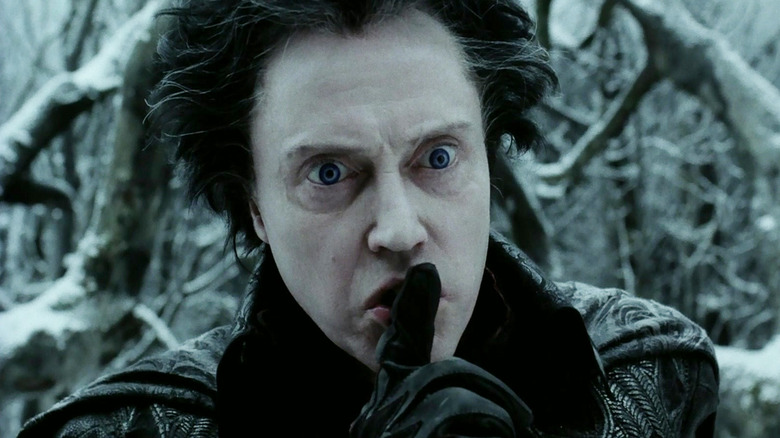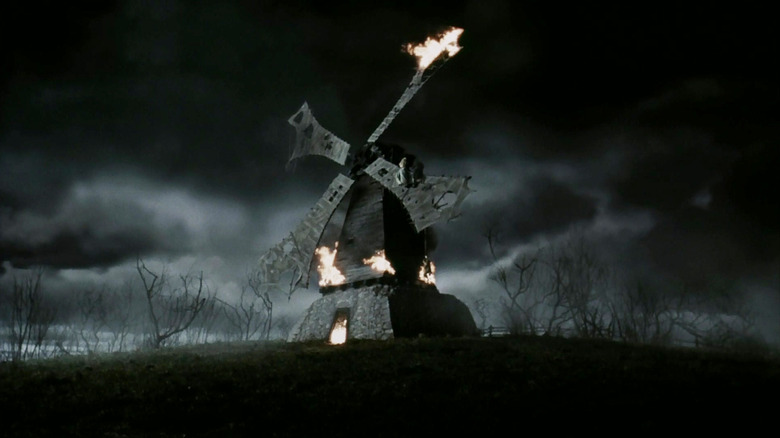Tim Burton Didn't Know A Legendary Filmmaker Produced Sleepy Hollow Until He Saw The Trailer
American Zoetrope's filmography is kind of mind-boggling. Co-founded by "Movie Brats" Francis Ford Coppola and George Lucas in 1969, the distributor and production company has stayed pretty true to its mission statement of backing not just projects by Coppola and his family, but also experimental and international cinema. The list of directors that've had American Zoetrope in their corner at some point or another is just as extraordinary. There's Jean-Luc Godard, Akira Kurosawa, Wim Wenders, Paul Schrader, Agnieszka Holland, Hans-Jürgen Syberberg, Godfrey Reggio, Carroll Ballard, and, of course, Tim Burton. Wait, what?
It's true: At the peak of his powers in the 1990s, the ringmaster of the "macabre funhouse" (as /Film's BJ Colangelo has aptly put it) teamed up with Coppola's American Zoetrope for 1999's "Sleepy Hollow."
When you think about it, it's not so surprising that Coppola got in on Burton's creep-tastical revamp of Washington Irving's 1820 short story "The Legend of Sleepy Hollow." Only seven years prior to that, Coppola had rendered his own maximalist Gothic horror retelling on the screen with "Bram Stoker's Dracula." Both films are gorgeously blood-drenched affairs that play their swooning romances and melodramatic machinations with a straight face (plus a little of Burton's puckish wit in the case of "Sleepy Hollow"), all the while relying heavily on old-school movie magic to realize their fantastical settings and characters (although "Dracula" goes to a much greater extreme with its use of in-camera trickery). Naturally, American Zoetrope was also behind Kenneth Branagh's own installment in the '90s canon of gonzo horror literary remakes with 1994's "Mary Shelley's Frankenstein."
At the same time, Coppola himself had absolutely nothing to do with the day-to-day making of "Sleepy Hollow." In fact, it wasn't until post-production that Burton even found out about his involvement with the film.
That feeling when you find out Francis Ford Coppola produced your movie
If they gave a prize to the person on a film set whose occupation nobody actually understands, the winner would probably be an executive producer. That's only a slight exaggeration, too; as /Film's Jeremy Smith explains in his breakdown of cinema's most confusing job, EPs tend to be big names that lend a movie "an air of importance" that can be useful in marketing ... as anyone who's ever had Steven Spielberg, Kathleen Kennedy, or Frank Marshall (if not all three of them) in their corner could tell you. But EP roles are also known for being much less intimate than those of other producers, to the degree that the director may never even cross paths with them during shooting.
So it was with Burton and Coppola on "Sleepy Hollow." In the book "Burton on Burton" (which was edited by Mark Salisbury), Burton revealed that he only became aware that Coppola was one of the movie's EPs upon receiving a copy of its trailer and seeing the "Godfather" and "Apocalypse Now" director's name listed in its credits. "I went, 'What the f***! Wait a minute, Chris [Lebenzan, editor], play that back,'" Burton recalled. It wasn't all that unusual an experience for him, either. "[...] It often happens that way," the director added. "I remember on 'Batman,' I never even met the executive producers. You spend a year or two working on something and then the main credits come up and you go, 'Who the f*** is that guy?'"
Funnier still, Burton had nearly collaborated with both Coppola and Oliver Stone four years before "Sleepy Hollow" on "Weird Tales," a horror anthology TV show inspired by the titular pulp fantasy and horror magazine launched in the early 1920s. Per Variety, the plan was for Burton, Coppola, and Stone to direct "one of three episodes in a 90-minute pilot," with "Pumpkinhead" writer Mark Patrick Carducci (who, sadly, died by suicide in 1997) and Peter Atkins (who penned several "Hellraiser" films and the original "Wishmaster") running the show. The series ultimately never came to fruition, but Burton and Coppola still managed to eventually find a horror project to work on together. Sort of.

